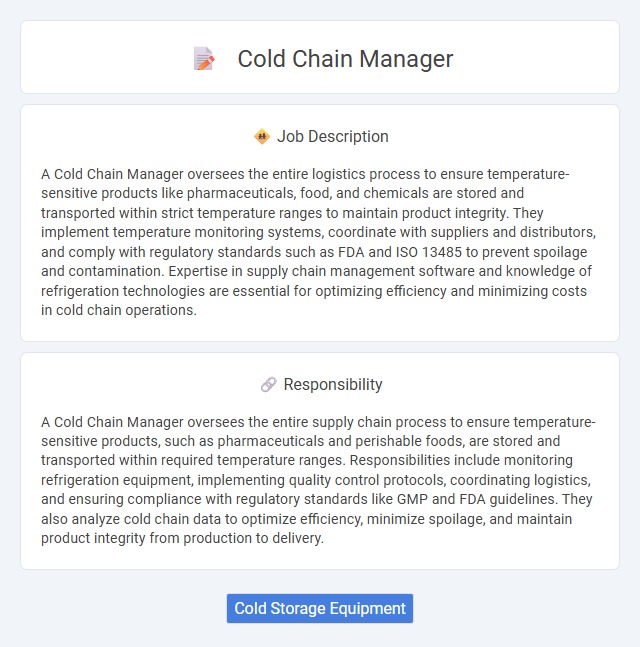
A Cold Chain Manager oversees the entire logistics process to ensure temperature-sensitive products like pharmaceuticals, food, and chemicals are stored and transported within strict temperature ranges to maintain product integrity. They implement temperature monitoring systems, coordinate with suppliers and distributors, and comply with regulatory standards such as FDA and ISO 13485 to prevent spoilage and contamination. Expertise in supply chain management software and knowledge of refrigeration technologies are essential for optimizing efficiency and minimizing costs in cold chain operations.
Individuals who are detail-oriented, possess strong organizational skills, and can handle high-pressure environments may be well-suited for a Cold Chain Manager role. The job likely demands resilience due to managing temperature-sensitive products, which can impact perishable goods if not handled properly. People who thrive in roles requiring precision and responsibility might find a good fit in this career, whereas those who struggle with strict protocols or irregular hours may face challenges.
Qualification
A Cold Chain Manager must possess a strong background in supply chain logistics, typically holding a bachelor's degree in supply chain management, logistics, or a related field. Expertise in temperature-controlled storage, transportation processes, and regulatory compliance such as FDA and HACCP standards is essential. Advanced skills in inventory management software, quality assurance, and risk assessment contribute significantly to maintaining product integrity throughout the cold chain.
Responsibility
A Cold Chain Manager oversees the entire supply chain process to ensure temperature-sensitive products, such as pharmaceuticals and perishable foods, are stored and transported within required temperature ranges. Responsibilities include monitoring refrigeration equipment, implementing quality control protocols, coordinating logistics, and ensuring compliance with regulatory standards like GMP and FDA guidelines. They also analyze cold chain data to optimize efficiency, minimize spoilage, and maintain product integrity from production to delivery.
Benefit
Cold chain managers likely provide significant benefits by ensuring the proper storage and transportation of temperature-sensitive products, which reduces spoilage and maintains product quality. They probably enhance operational efficiency through optimized logistics and compliance with regulatory standards, minimizing costly delays and losses. Furthermore, their expertise might contribute to stronger customer trust and brand reputation by guaranteeing product safety and reliability throughout the supply chain.
Challenge
Cold chain managers likely face challenges in maintaining precise temperature control throughout the supply chain to ensure product integrity. They probably must navigate logistical complexities and regulatory compliance to prevent spoilage and contamination. Managing unexpected disruptions, such as equipment failures or transport delays, is often a critical aspect of their role.
Career Advancement
A Cold Chain Manager oversees the storage and transportation of temperature-sensitive products to ensure quality and compliance with industry standards. Expertise in logistics, regulatory knowledge, and technology implementation enhances career advancement opportunities, enabling progression to senior supply chain or operations roles. Developing skills in data analysis and leadership further positions professionals for higher management and strategic decision-making positions.
Key Terms
Cold Storage Equipment
Cold chain managers ensure the efficient operation and maintenance of cold storage equipment to preserve perishable goods at optimal temperatures. They oversee refrigeration systems, temperature monitoring technologies, and inventory control to prevent spoilage and maintain product quality. Expertise in cold storage equipment calibration and troubleshooting enhances supply chain reliability and regulatory compliance.
 kuljobs.com
kuljobs.com